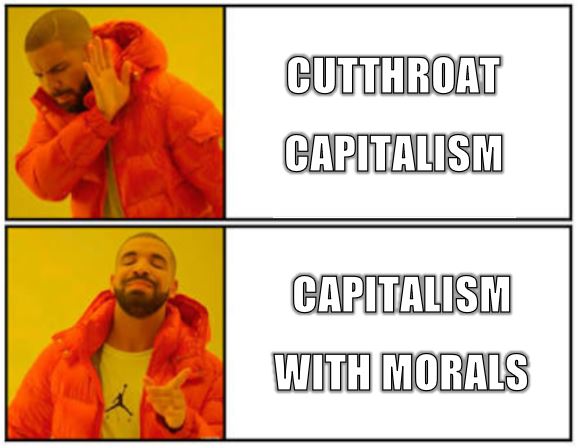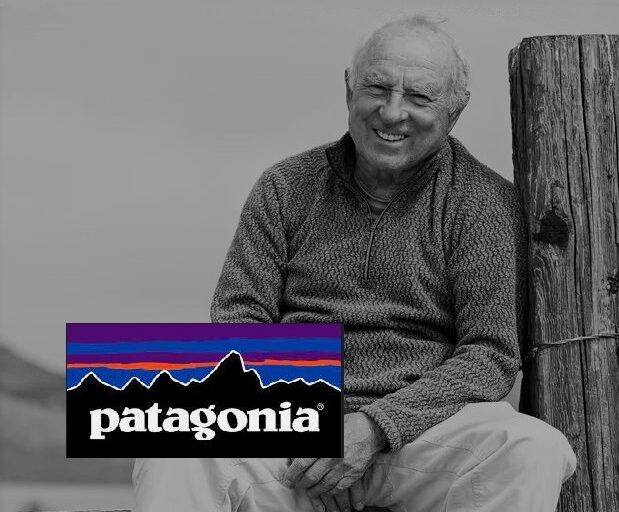Last week, the founder of Patagonia, Yvon Chouinard, transferred all ownership of the company to two new entities. The first is the Patagonia Purpose Trust, which will now own 2% of Patagonia shares (the voting stock) and the second, is the Holdfast Collective, which will own 98% of the company’s shares (the nonvoting stock). The Trust will be overseen by a board made up of Chouinard family members and their closest advisors, which will ensure the company maintains its purpose of fighting the ongoing climate crisis.
I wanted to talk about this news because what Chouinard has done here proves that capitalism doesn’t have to put profit before planet.
Unlike most billionaires, who pledge philanthropy only to donate a small fraction of their wealth as capitalism allows them to continue growing said wealth, Yvon Chouinard and his family have followed through with their commitment to the environment. They paid their taxes on the donation to the Patagonia Purpose Trust ($16.5 million) and did not seek a huge tax break with their donation to the Holdfast Collective, because of its 501(c)(4) not-for-profit social welfare structure. This is true generosity without financial gain.
My Thoughts on Capitalism
Capitalism has its benefits. Without it, there would be no motivation towards advancement and innovation. It provides opportunities for those born in less fortunate circumstances to elevate their social class. The success of capitalism can signify positive economic growth.
The problems start to happen when individuals and corporations ignore their consciences and let money and materialism do the talking. I’m talking about such problems as exploitation of labor, unhindered exhaustion of earth’s finite resources, environmental damage and pollution, and increasing inequality where the rich get richer and the poor get poorer.
Looking for ways to skip corners, swindling suppliers or laborers, ignoring responsibility to people and planet, taking any means necessary without remorse to increase the bottom line – these are the prevalent practices that corrupt the good potential of capitalism. These are the reasons why I am not such a big fan.
When we participate in capitalism, supporting big corporations with our hard-earned income, are we complicit in its damages? I don’t think so, because as consumers, we are so far removed from the supply chain that feeds it. The corporations would argue that all moral responsibility falls on the consumer. They’re the ones demanding and choosing our products. Environmental activists would argue that corporations should be responsible for their detrimental practices. They’re the ones creating the problems. It’s a complicated discussion with valid arguments on both sides. But rather than point fingers, a simple solution would be for all of us to do better. And Patagonia is setting the example.

Patagonia’s Principles
Even though Patagonia’s success made him very wealthy, Yvon Chouinard is hardly the typical image of a billionaire. He wears old clothes, drives a shoddy old car, and lives in a modest home. His like-minded wife and children also espouse the same ideals.
He founded the company on the same idealistic principles by which he lives. He prioritized sustainable materials, like organic cotton, and sustainable manufacturing practices. For many years, the company has donated sales to grass root activism to promote positive environmental impact. They have a subsidy, called Worn Wear, that collects and repairs old apparel and gear to be upcycled and resold. The company even famously went against the spirit of capitalism with an advertisement that read “Don’t Buy This Jacket.”
Not only did the Chouinards have noble intentions, but they executed those intentions with great success. According to a New York Times article, “Patagonia has already donated $50 million to the Holdfast Collective, and expects to contribute another $100 million this year, making the new organization a major player in climate philanthropy.”
When it came time to think about succession, Chouinard didn’t find any favorable path within the present capitalist landscape. He didn’t want his children to appear as just financial beneficiaries and they didn’t want to take the helm anyway. And going public also didn’t fit. He believed that going public would sacrifice control, arguing that “even public companies with good intentions are under too much pressure to create short-term gain [to please shareholders] at the expense of long-term vitality and responsibility.”
Which is why he and his advisors created a novel solution, utilizing the trust and the 501(c)(4) organization, to ensure Patagonia’s continued success would only fund the fight against climate change.
“Instead of ‘going public,’ you could say we’re ‘going purpose.’ Instead of extracting value from nature and transforming it into wealth for investors, we’ll use the wealth Patagonia creates to protect the source of all wealth.
Hopefully, this will influence a new form of capitalism. We’re making Earth our only shareholder. I am dead serious about saving this planet.”
– Yvon Chouinard, Patagonia Founder
Capitalism with Morals
I like this adjusted form of capitalism better. For years, the developed world has pushed for nonstop progress, barreling forward without looking back or even considering the present. By following Yvon’s example, I hope other companies recognize a need for change. It’s somewhat ironic how capitalism, which breeds innovation and disruption, would also lead a businessman to disrupt capitalism itself.
In fairness, there has been an upward trend in corporate responsibility and ESG initiatives (environmental, social, & corporate governance). Every little bit counts, but because large companies have the capital, they have the greatest means to make sweeping changes that can make significant impacts.
Mike Baxter, the fictional father on the sitcom Last Man Standing, played by Tim Allen, put it best. He said “capitalism – it’s just a recipe for economic success and it doesn’t taste quite right until you sprinkle in a little morality!” Tim Allen even shared a tweet showing the clip of his character explaining capitalism in his vlog.
What I like about this message is that making money doesn’t have to overpower principles. And even if passion for the planet isn’t a principle that you prioritize, I think caring about the safety and dignity of fellow humans is a principle that everyone can agree with. When you take that to heart – paying for and compensating workers well, ensuring that the communities in which employees both work and live is safe and clean, and ensuring every step of the supply chain does the same – the planet will indirectly benefit as well. People over profit. Planet over profit.
What can we do as consumers?
Now, I don’t consider myself a capitalist. Although, I do have to grow this blog to make it successful to earn an income, which would make me a capitalist. But I don’t intend to lose my principles and passion for the planet in the process.
Here are some other ways that I say ‘no’ to the objectionable version of capitalism:
- I limit my support of fast fashion brands. Shein, Forever21, Fashion Nova, etc. These companies prioritize quick and cheap production; staying on pace with everchanging style trends is more important to them than ensuring all workers are compensated well or reducing carbon footprint, which is massive in the clothing industry. I buy clothes less frequently nowadays, and when I do, it’s usually from a secondhand source. Or, if I do buy something new, I look for quality over price. The one caveat is that I have a weakness for shoes, and good secondhand shoes are hard to come by, so I will occasionally allow myself a ‘fast fashion’ shoe purchase. I do recognize though, that my social status gives me the privilege to make these choices, whereas for others, cheap clothing is the only option.
- I significantly limit my use of Amazon. Amazon has, in my book, a lot of misdemeanors on its track record – large carbon footprint, unsafe work environment due to pressures of speedy production (both for factory workers and delivery workers), excessive packaging waste, bad for small businesses, utilizing taxpayer money when it already has a ton of wealth. Anyway, (before I go off), I look at Amazon as a last resort. If I need to buy something, I’ll first look to any brick-and-mortar stores nearby, or check Etsy, so that I can support a small business. Or I’ll look for secondhand items on FB marketplace, because there are actually some good finds on there. With these alternatives, I can usually find what I need, but if not, I will cave and use Amazon. But to illustrate the infrequency, I checked my history and I’ve made just 8 orders within the last 3 years.
- I support local or small business, practice patience, and buy less. I love Esty (but I always check the ship-from location so that I stick with domestic shops). I rarely use expedited shipping (including avoiding Amazon Prime 2-day), because to me, patience equates to not perpetuating this ‘now, now, now’ mentality which pushes supply chains to their limits. And I think rethink my purchases, so that I’m not just accumulating unnecessary things (an incidental frivolous purchase allowed from time to time) while also being friendly to my wallet.
And if those seem beyond your reach, here are some other ideas that may resonate with you instead:
- Avoid impulse buying. Stop and think ‘do you really need this?’ Happiness does not need to exclusively exist in the material.
- Choose quality over quantity. One well-made item that lasts a long time is a better investment, both financial and environmentally, than repetitive low-value purchases.
- Sign petitions to hold companies accountable. Websites like Move On are great platforms where you can easily search for and sign petitions that align with what’s important to you as a citizen and as a consumer.
- Whenever you buy something, think about where it comes from. It’s hard to imagine how one purchasing decision affects so many others, with ripple effects in our communities and environment. Because we don’t see these affects. But learning more about where things come from, the processes and systems behind the creation of single product, can help us make more ethical decisions.
Hooray for the Chouinards and Patagonia!
Sure, ignorance is bliss. We don’t want to know how the sausage is made. We like the conveniences that capitalism brings. If you want keep using the Amazon, I won’t stop you or shame you (I still do on occasion). But if you chose to support a small business instead, I would applaud you. If you were to invest in a timeless, good quality piece of clothing that lasts years instead of a cheaply made, trendy piece that you wear twice and get rid of, I would applaud you. Any small positive tweaks that are in your power to make, I will applaud. But the Chouinard family, you deserve a standing ovation.
“Hopefully, this will influence a new form of capitalism. We’re making Earth our only shareholder.”
– Yvon Chouinard
*Disclaimer: this is not sponsored by Patagonia.
References
The New York Times – https://www.nytimes.com/2022/09/14/climate/patagonia-climate-philanthropy-chouinard.html
Patagonia – https://www.patagoniaworks.com/press/2022/9/14/patagonias-next-chapter-earth-is-now-our-only-shareholder
Yvon Chouinard – https://www.patagonia.com/ownership/

